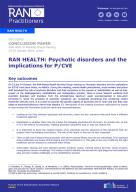Details
- Publication date
- 8 December 2023
- Author
- Directorate-General for Migration and Home Affairs
- RAN Publications Topic
- Mental health issues
Description
On 23 and 24 October, the RAN Mental Health Working Group meeting on ‘Psychotic disorders and the implications for P/CVE’ took place online, via WebEx. During this meeting, mental health practitioners, social workers and prison staff discussed the role of psychotic disorders and their symptoms in the process of radicalisation as well as their impact on the disengagement, rehabilitation and reintegration process.
There is some research evidence that psychotic disorders and disorders from the schizophrenia spectrum seem overrepresented in lone-actor terrorists (1). Since the presence of psychotic symptoms can complicate preventing and countering violent extremism (P/CVE) work, it is crucial to examine the specific aspects of psychosis and if, when and how they may relate to extremist behaviour rather than ideation (2). Participants of the meeting discussed implications by means of case studies and formulated practical needs and recommendations:
- Looking at the links between psychosis and terrorism, there are four scenarios that each have a different treatment approach.
- Dependent on whether there may be a direct link between psychosis and terrorism, an indirect link, no link or it is the case of no psychosis. Treating psychotic symptoms may or may not reduce risk.
- It is important to know the medical history of an individual and the sequence of the symptoms that are present when formulating conclusions. The role of the family in this can be very important.
- There is still a lot of stigma around persons with severe mental illness and who are radicalised. It is important that practitioners are aware of this stigma and not contribute to it. This gets in the way of offering the right treatment and for persons to overcome their illness.
- Information sharing and trust between parties (medical, police, criminal justice services, social services, immigration) remain a challenge. This makes it hard to identify risk and set the right diagnosis and treatment plan and also creates challenges in the rehabilitation process.
This paper summarises the main conclusions following the discussions and presentations.

